MATTERS OF OBSESSION
A ring of empowerment: The circus that teaches young people how to win at life
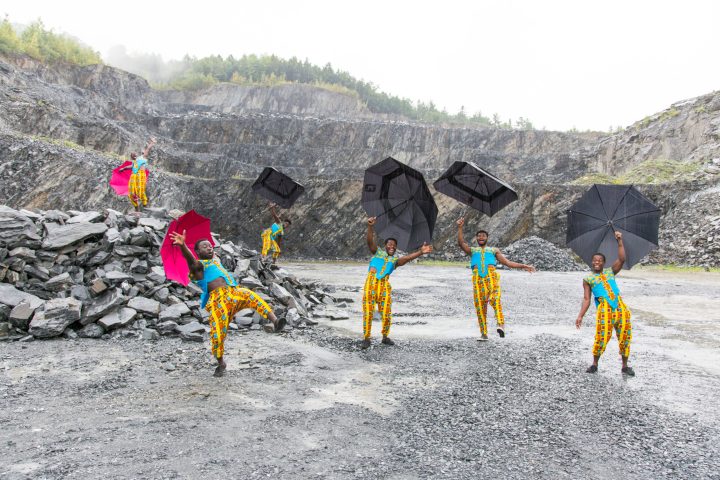
A Zambian circus group’s social initiatives could teach us all a lesson about the undervalued importance of play.
Gift Chansa grew up in Chibolya, a neighbourhood in Lusaka, Zambia, known as one of the roughest parts of the city. Stereotyped as a festering hub of crime and drug culture, Chansa’s childhood backdrop came with a lot of baggage.
According to Chansa, “If you come from Chibolya, then no one takes you seriously.” Few people in Lusaka would hire someone from Chibolya, and at job interviews Chansa and his friends used to say that they were from somewhere else, anywhere else.
“Sometimes though,” said Chansa, “you don’t think about it and you say, ‘I am from Chibolya’, and then people treat you different. You’re always pushed back and reminded where you come from.”

Charles Malama and Bergus Siatubuto, handstand. Photo by Atanga Mugandi, Uncoura photography.
It’s a vicious cycle, almost impossible to escape. No one could have predicted that Chansa was destined to fly – there were to be no boundaries pushing him back, and nothing stopping him from bringing Chibolya along for the ride.
It was in the streets of Chibolya, about 16 years ago,that the seeds of Chansa’s incredible journey were sown. Having learnt how to do a perfect backflip simply through playing, a nine-year-old Chansa and his childhood pals put together an informal acrobatics group, and organised street competitions and shows that other kids from the neighbourhood would come and watch.
During one of these competitions, Chansa was scouted by Mr Kapota – a minor celebrity (and major personality) in Lusaka at the time – to be a part of an acrobatic group of young people called the African Dance Factory, started in 2005. It was through this that he was introduced to Barefeet Theatre in 2006, a performance group-come-grassroots initiative for underprivileged children in Lusaka.
Barefeet Theatre’s programming provided Chansa with the platform that he needed to soar. He was exposed to artists and academics from around the world, introduced to other teenagers who were interested in performance arts, and given the responsibility of facilitating his own workshops and performances. Most importantly, he was provided with a safe space in which he could learn to trust and express himself.
Chansa and his friends spent almost every waking hour after school practising, competing, and showing off their moves. “It was a way of life, I would say.” There was no time outside of training to get dragged into harmful activities (such as drugs, drinking, and quick money schemes) to which teenagers are susceptible.
“I think, in a way, it protected us, because we always had something to do.”
By 2013, Chansa had become a junior facilitator at Barefeet. He toured the world, performing in Ireland, Zimbabwe, China and many other countries. The performance group also helped him enroll in a circus school in the Netherlands, where, during his final performance, he had a revelation.
“I was amazed by how many people came to see the performance that we did. I was like, oh, people want to see me do this, they want to see me in the circus. People actually appreciate this.”
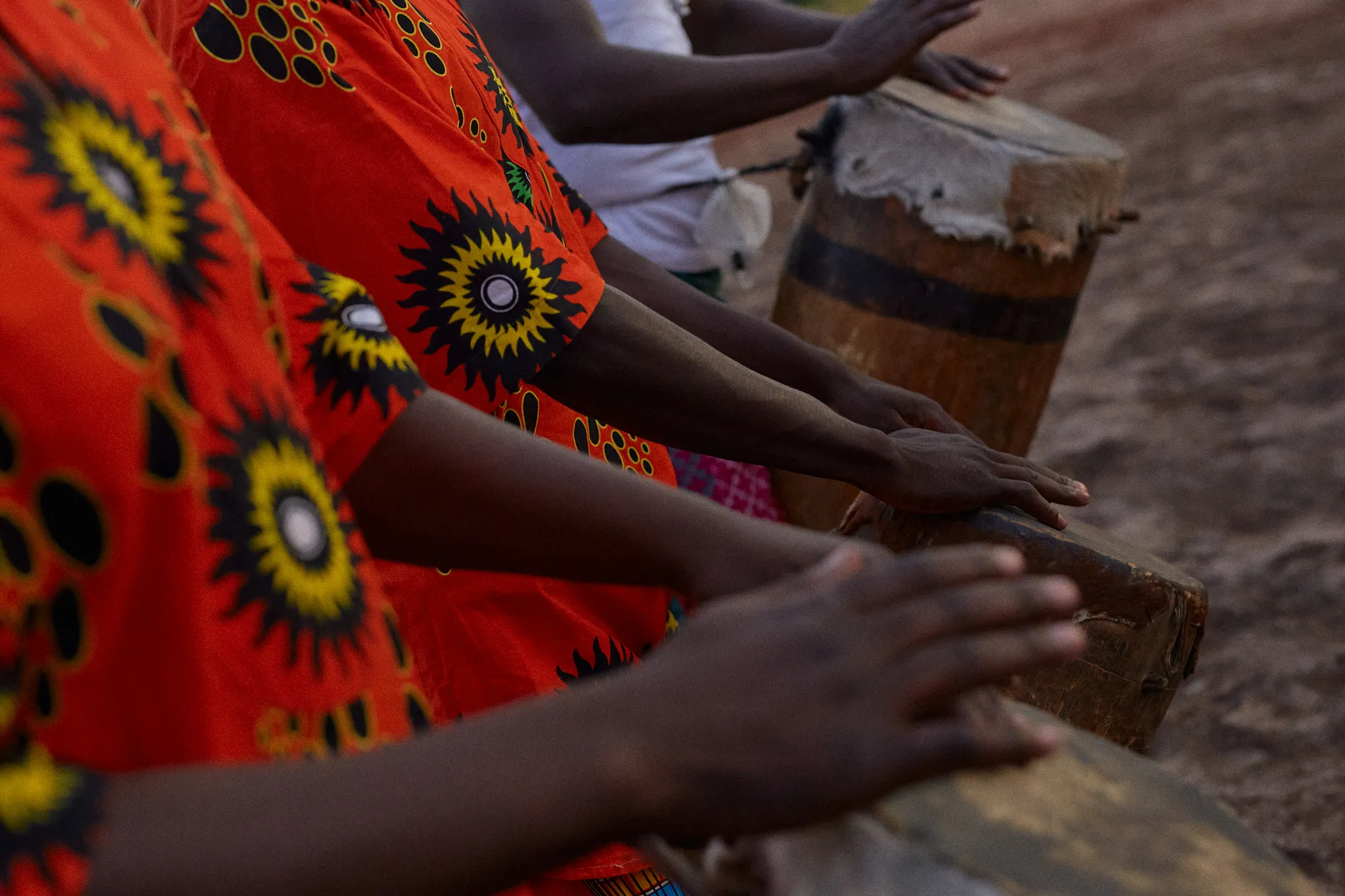
Drummers. Photo by Atanga Mugandi, Uncoura photography.
At that moment Chansa knew that he wanted to bring the circus back to Chibolya, and to put on shows in the neighbourhood itself.
“That way people could come into the compound and see our shows and see that not all young people from there are criminals. There are also young people who need a chance. They need help to reach their full potential.”
And thus was the genesis of Circus Zambia, what Chansa refers to as “a social enterprise that equips young people with circus, life skills, education support, and job opportunities”.
Co-founded in 2016 with Chansa’s childhood friends, Amos Malokwa and Bernard Kaumba, as well as Charlotte Groen from the Netherlands, Circus Zambia comprises two major parts. The first is the performance company (the guys who are professional at eating fire, juggling, stilt-walking etc.) The incredible bodily feats executed by this group provide a substantial amount of the funding for the latter section of Circus Zambia: The Social Circus Hub.
The Social Circus Hub programme is designed to support the development of children from Chibolya and other underprivileged neighbourhoods in Lusaka. Healthy living, community building, and body contortions are all a part of the holistic curriculum, which is organised into three sections: Body, Mind, and Soul.
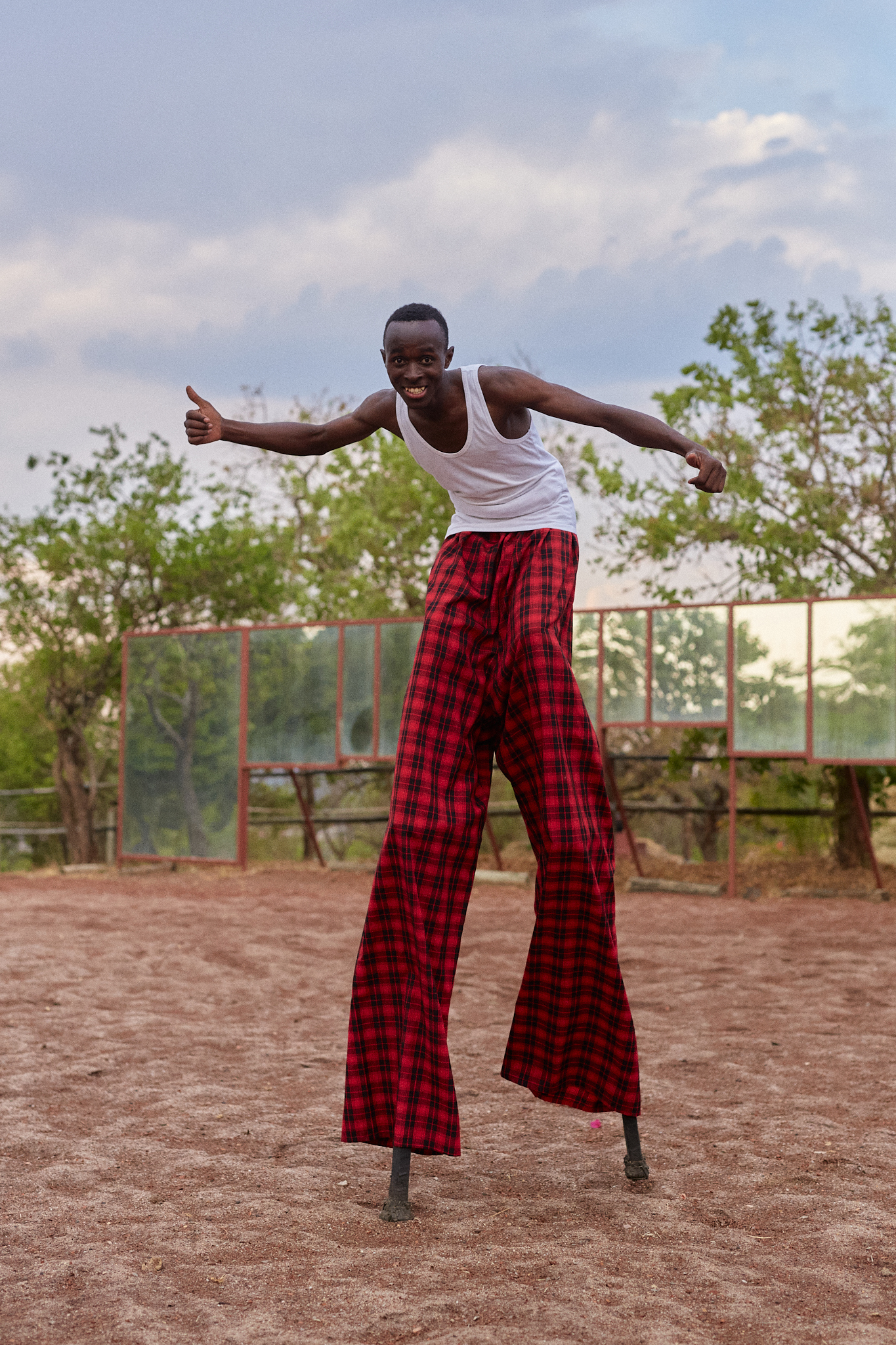
Tapiwa Chalila on stilts. Photo by Atanga Mugandi, Uncoura photography.
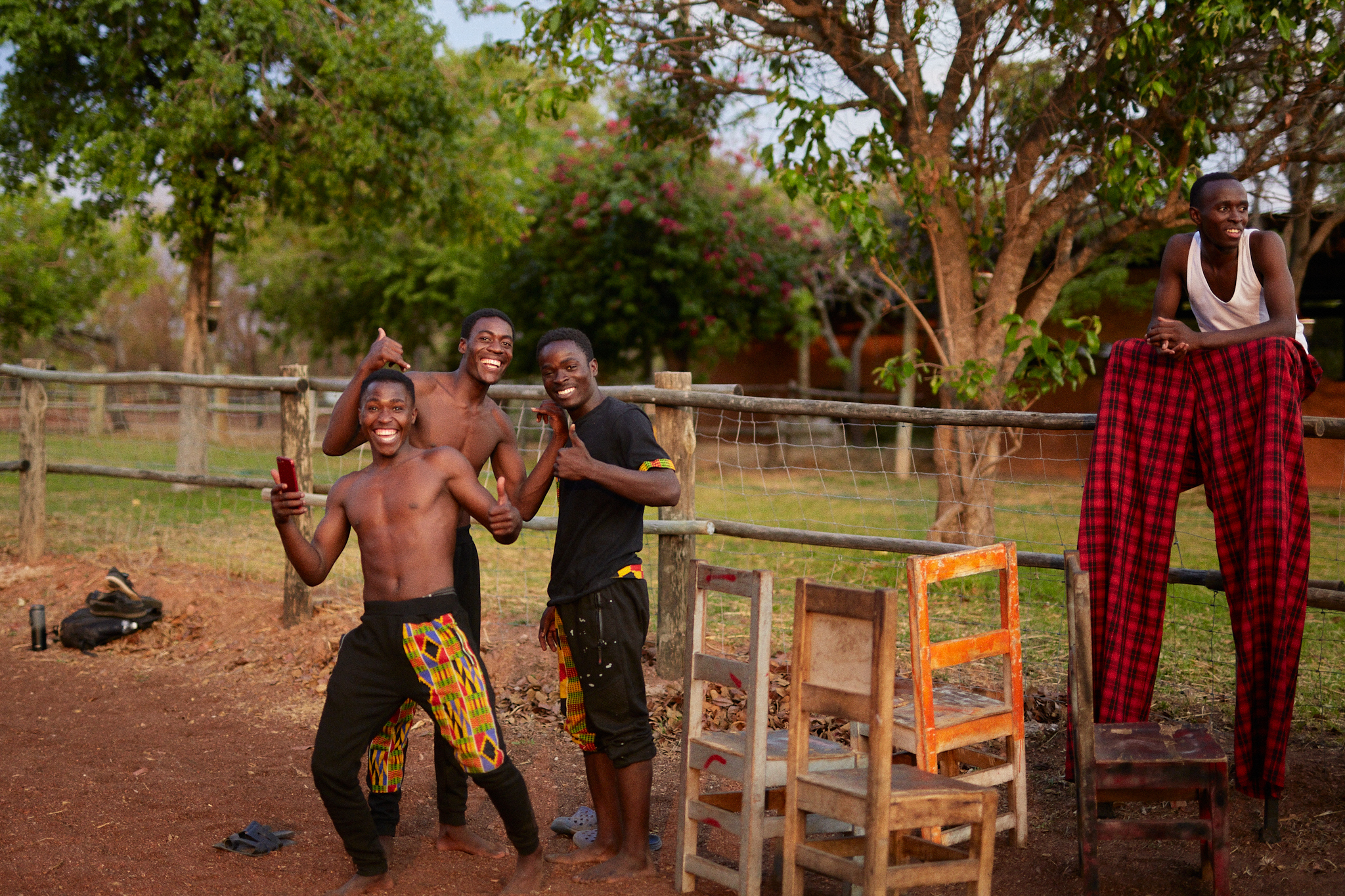
Stilts, behind the scenes. Photo by Atanga Mugandi, Uncoura photography.
The Body section of the programme is the physical training. Chansa calls it the “roadmap for young people to learn how to be performers, how to do acrobatics, how to juggle, do a handstand, a backflip”.
Children enroll in the “Toes” level, then progress through “Knees,” “Shoulders,” and finally “Heads.” Once you are a “Head” you are a trained circus performer. Many of the programme’s graduates stay to be a part of Circus Zambia itself, while others join circus troupes elsewhere in the world.
The Mind section of the Social Circus is all about education. Circus Zambia provides money for about 100 children a year to attend local schools. The funding, when it doesn’t come directly from the revenue generated by the shows put on by the performance company, comes from international grants as well as local benefactors and campaigns on gofundme. The circus also has a library programme in which children are exposed to literature and are able to borrow books at any time.
The final section, Soul, is the real essence of the circus. It tackles issues that young people face in local communities, issues that are difficult to tackle within traditional social structures.
One such issue is that of safe sex. “It’s hard to talk about sex in Zambia,” Chansa told the Thomson Reuters Foundation in 2018, “nobody talks about sex.” This is a huge problem in a country that was so devastated by the AIDS epidemic in the early 2000s.
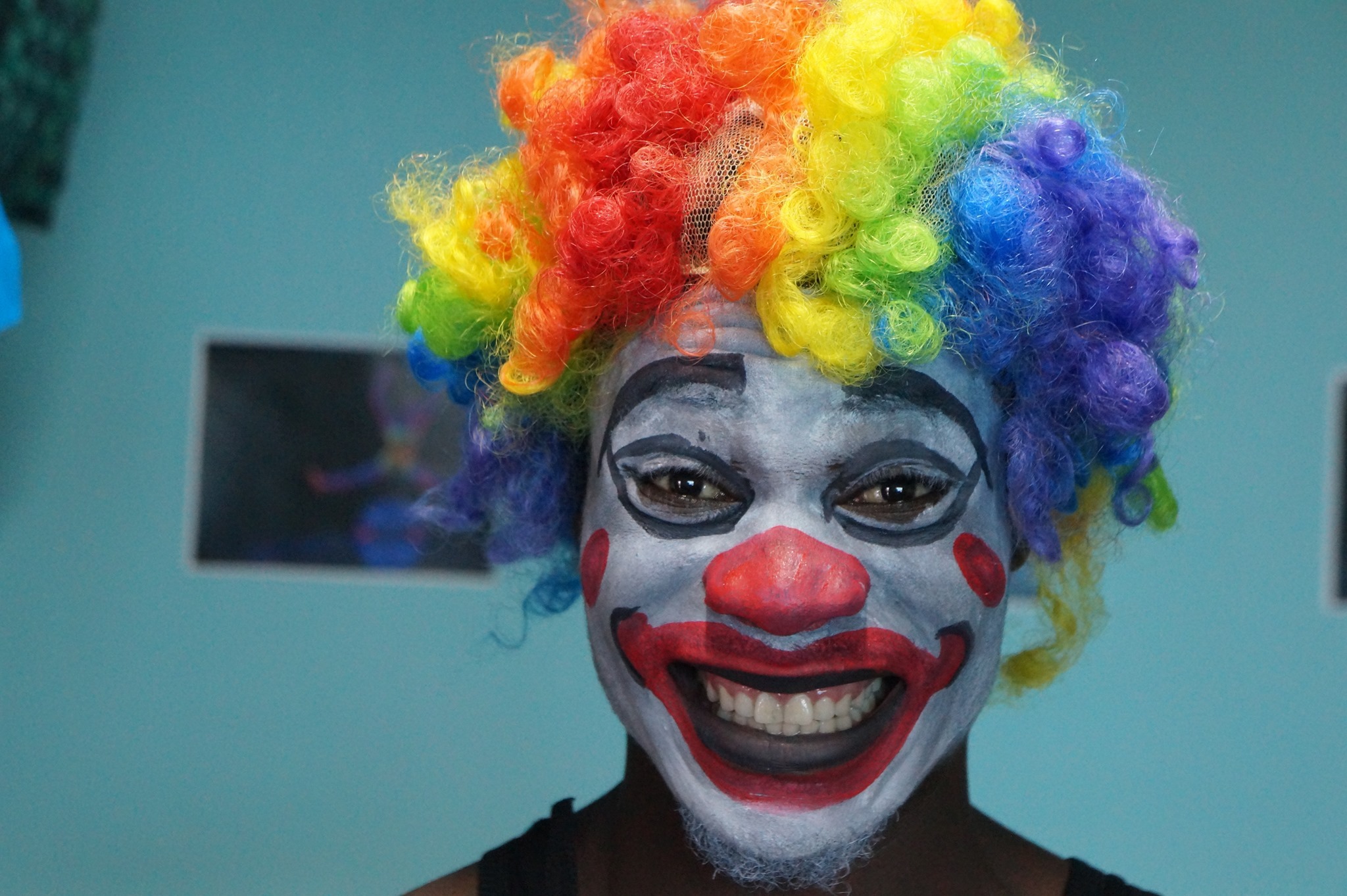
Gift Chansa aka Mwansa the clown. Image courtesy of Circus Zambia
Circus Zambia’s “Clowns for Condoms” initiative is an attempt at talking about these issues in an entertaining way. Sponsored by MTV Staying Alive Foundation, the circus puts together hilarious shows and workshops that freely address the issues of STIs, safe sex, condoms, and the origins of HIV. The clowns are usually accompanied by members of the AIDS Healthcare Foundation, who provide testing and further educational literature on the subject.
Another issue that was tackled by the circus’s Soul programme was that of gender equality and women empowerment. A project named Pamodzi Ya Bakazi, sponsored by Danish company CISU, featured performances that tackled some of the issues that women face.
The use of “clowning,” as Chansa refers to the humorous side of the circus, is essential in getting important messages across to both the members of the company and the audience.
“Fun is a good way to engage people because they’re watching you and they’re amazed. They’re happy. When we perform, we want people to have an experience, a memorable experience so that they won’t forget the message that we are actually portraying.”
What could be more memorable than a man riding a unicycle juggling fire sticks, and then talking about sex?

Gift Hambulo, fire-breather. Image courtesy of Circus Zambia
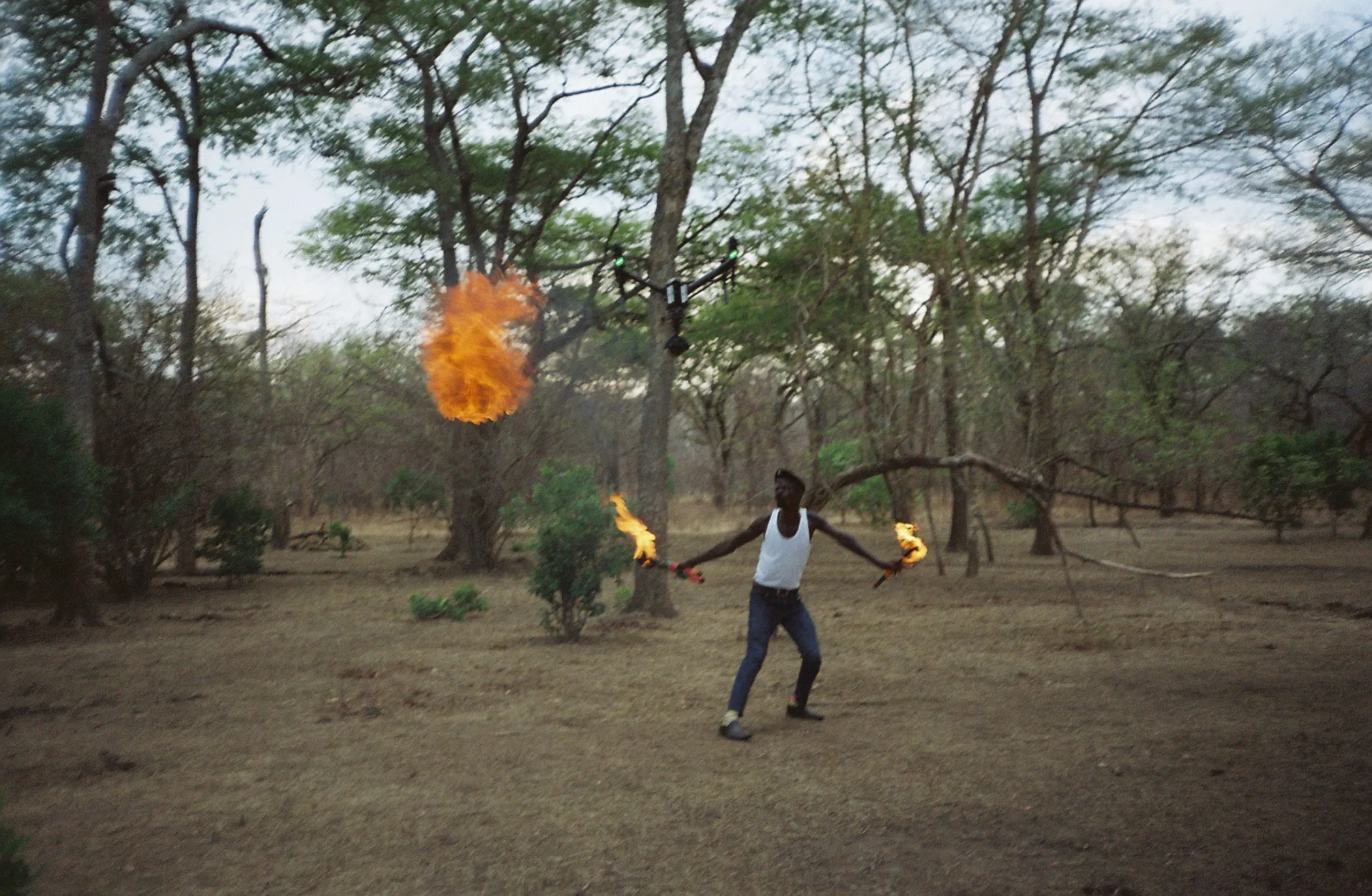
Gift Hambulo, fire-breather. Image courtesy of Circus Zambia
Fun and laughter are also therapeutic, says Chansa. We are so assailed with dreary stories, statistics, and troubling social realities that sometimes the only way to get things across is to feel better about them, “and when you laugh it’s infectious, because the person next to you will laugh, and the next person will feel the positivity”.
The Soul of the circus is “all about reaching out to young people and enabling them to become change-makers. Empowering them. Providing them with skills, soft skills in a way, so that they can reach their full potential,” Chansa explained. And, according to its own estimates, Circus Zambia has reached about 5,000 Zambian children per year since its establishment.
It’s fascinating that Circus Zambia has been so successful in these social initiatives, being that circuses have a historical reputation as a nexus for outsiders, freak shows, and vagabonds. Colloquially, one runs away to join the circus, they don’t return home and get social benefits from it.
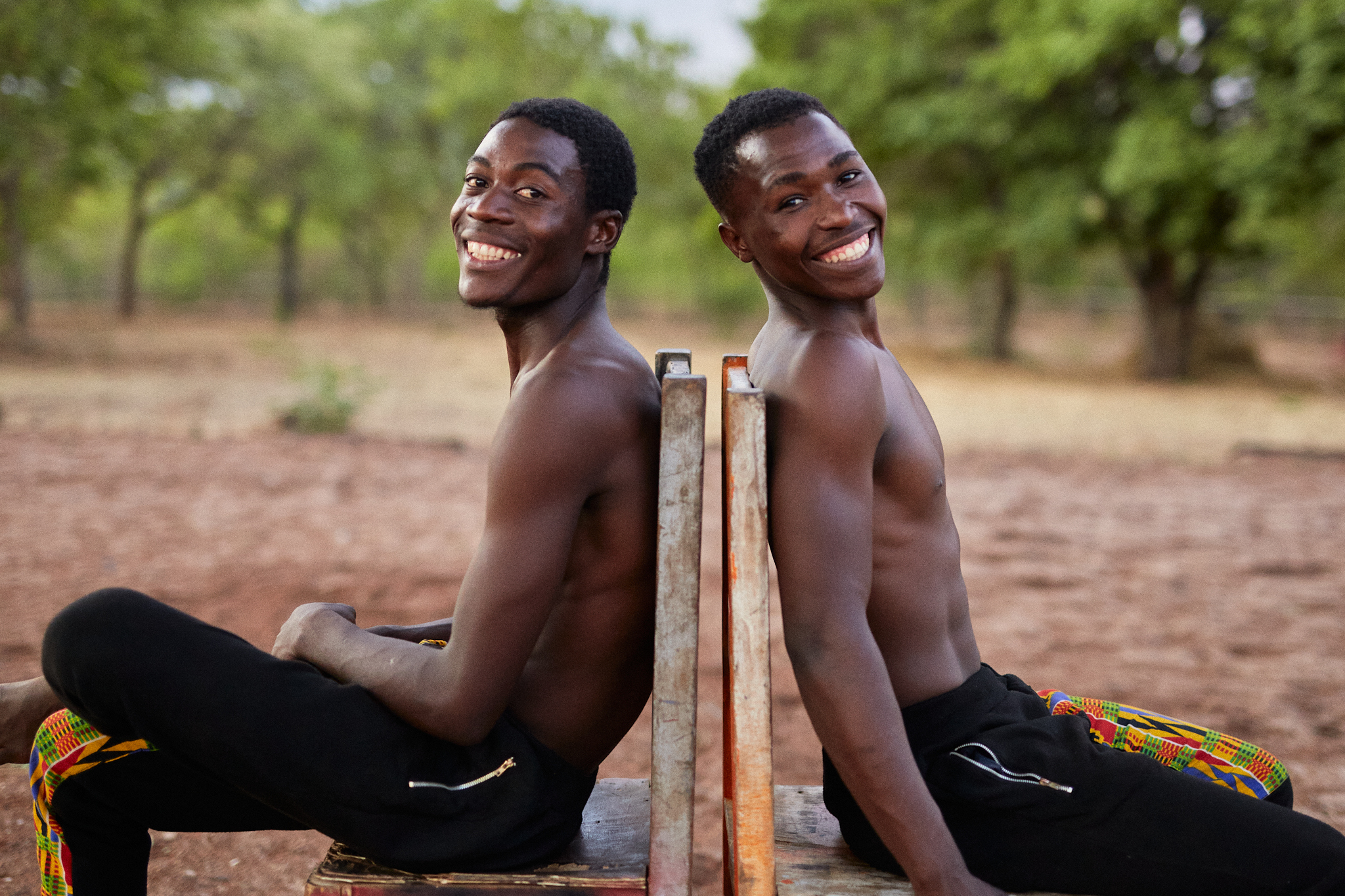
Charles Malama and Bergus Siatubuto the acrobats. Photo by Atanga Mugandi, Uncoura photography.
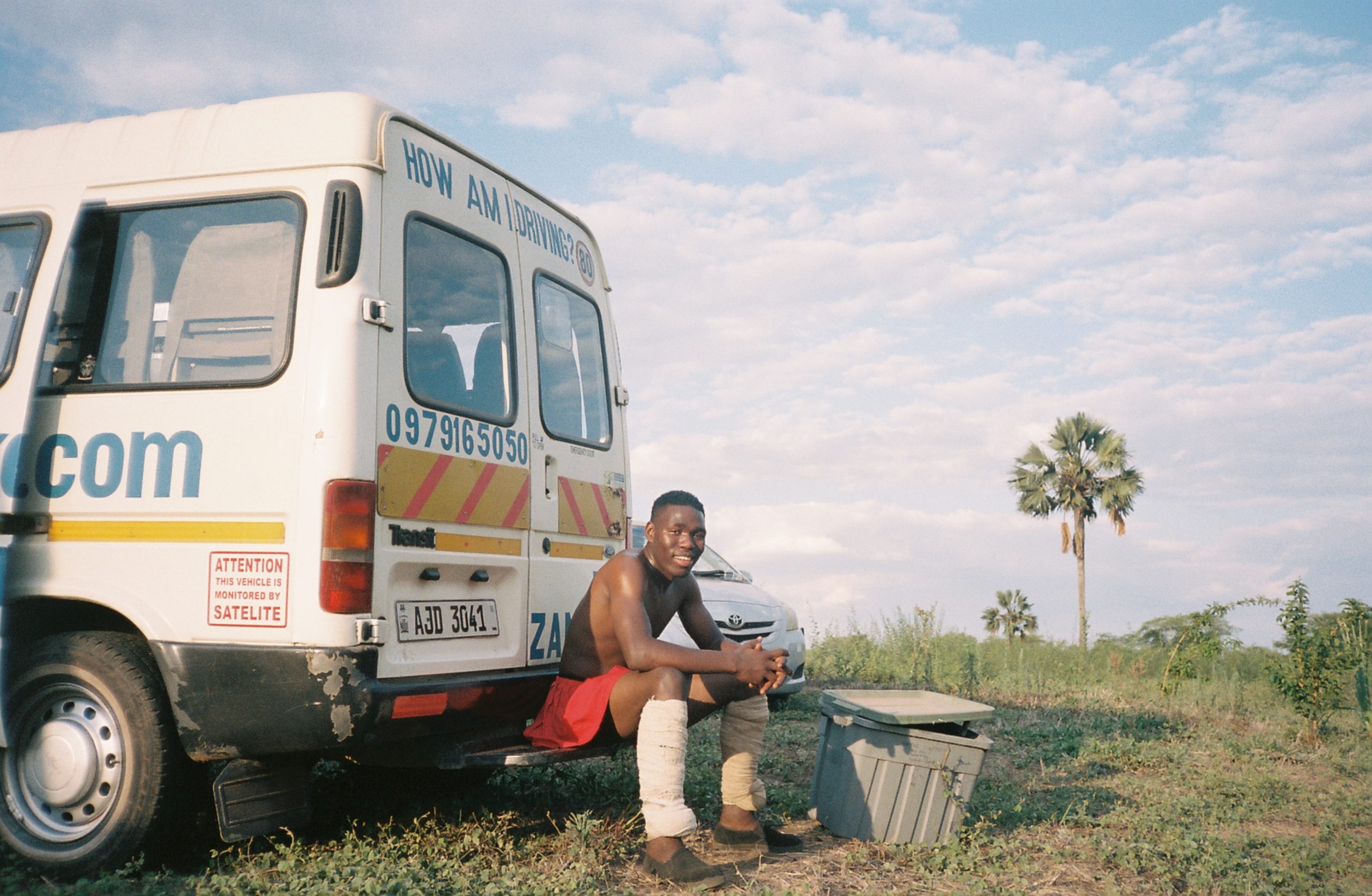
Benson, behind the scenes. Image courtesy of Circus Zambia
But this very fact is one of the reasons that it works so well, Chansa explains. A group of outsiders is almost always an accepting one; Circus Zambia aims to include children from all walks of life in its community. The circus is “not competitive, you work in an ensemble, as a team. When you’re developing something, you communicate and share ideas, and those are important things to learn for yourself. You learn to trust each other through the process of training.”
In the dog-eat-dog, late-capitalist, Covid-riddled world of today, an accepting community to bond and create with is a magical idea to anyone. But it’s paramount to the children of Chibolya, whose lives are in danger of falling back into the vicious cycle that coming from a rough neighbourhood implies.
Further, “when you perform, you express your feelings, you express who you are, and the people accept you. That builds you, because you can progress and change; you don’t stay the same person.”
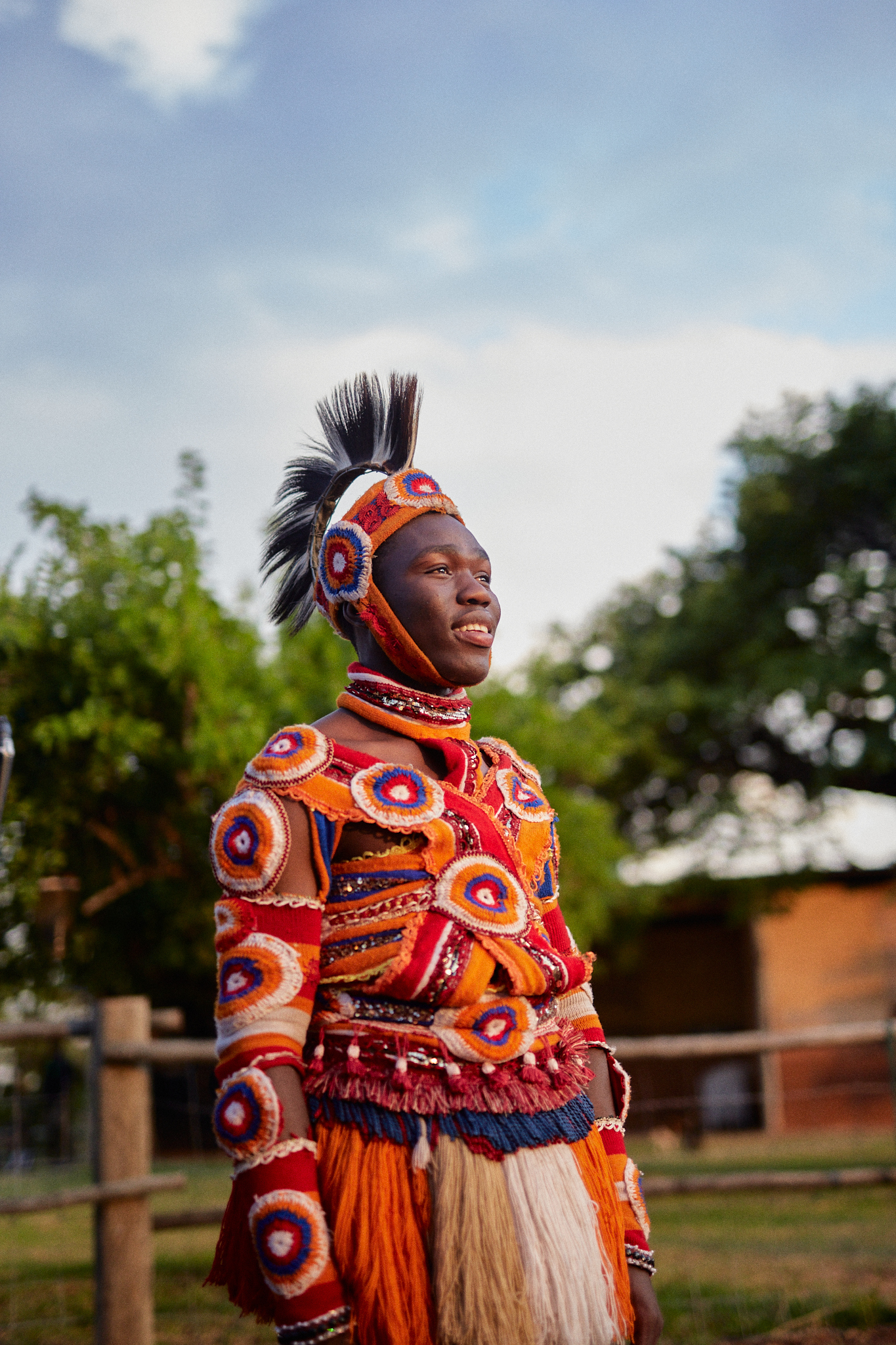
Benson, traditional dancer. Photo by Atanga Mugandi, Uncoura photography.

Gift Hambulo. Photo by Atanga Mugandi, Uncoura photography.
Chansa elaborated on the confidence that this type of expression affords children, and how important it is to their development and growth. He talked about teaching young kids who learn circus tricks extremely quickly.
“Just realising that they can pick something up, that gives young people confidence… young people, that when they came to Circus Zambia, they wouldn’t even speak in front of anyone because they were so shy. But now they can stand up to me and say, ‘What are you saying, Gift?’ And that fuels you. You realise that they’ve really grown, and they’re confident. And it’s because they stand in front of people and they perform and they’re interacting with different people in different ways.”
Joining the circus also teaches another invaluable lesson, one that’s needed to succeed in life: discipline. Chansa, in his personal journey, learnt that, “If I’m disciplined enough, I can achieve what I want through what I do, because in order for us to put up a performance we need to practise and train. What the audience sees is just the end-product that we have put so much time into creating, rehearsing, and perfecting.”
It’s the same sentiment that he wants to impart to the young members of Circus Zambia, “that discipline of when you drop something, you pick it up, you try again, you keep going”. It’s a trust in oneself, a confidence that through discipline and determination you can do things you thought impossible, a practice-makes-perfect mentality, that Chansa wishes to (and does) impart to the young members of Circus Zambia.
Part of growing this confidence is the acceptance of fear as an innate reality of life, but also as something that can be overcome. Children experience “the danger that goes in [to performing], the fears we have before we perform. What might happen, what might not happen.” They learn that even with hours and hours of practice, things go wrong, because life is unpredictable, and that’s okay. It’s about embracing fear, regarding it as a challenge to rise up to, rather than something to run away from.
The realities of Covid-19 have hit Circus Zambia hard. Their year of touring around the world was put to a stop, and many of their projects that required larger gatherings of children are obviously no longer safe to carry out.
“We’re surviving,” Chansa responded to a question about how Circus Zambia was doing. Just as he had learnt to embrace the fear and danger of circus performance, he has accepted the challenge of this new reality.
“It just made me realise that, okay, we’re taking a risk, we are always taking a risk. And I think it’s what we do best. And because of this I think we will survive.” DM/ML
















 Become an Insider
Become an Insider
Lovely, positive article Emma !